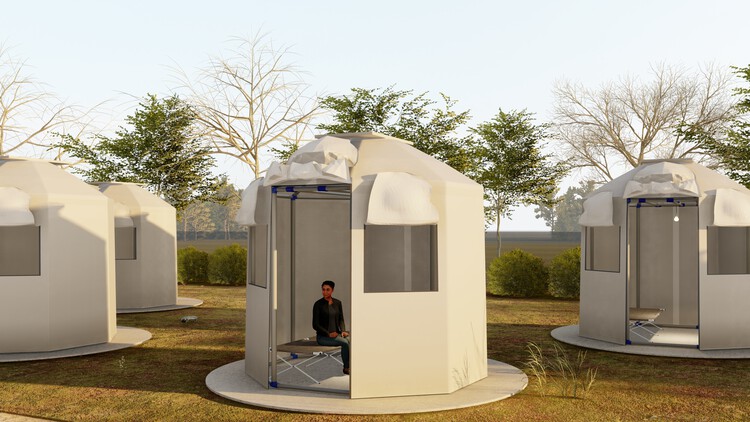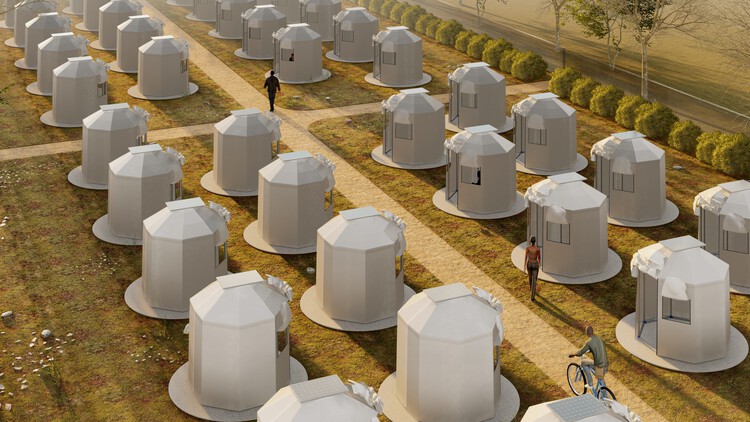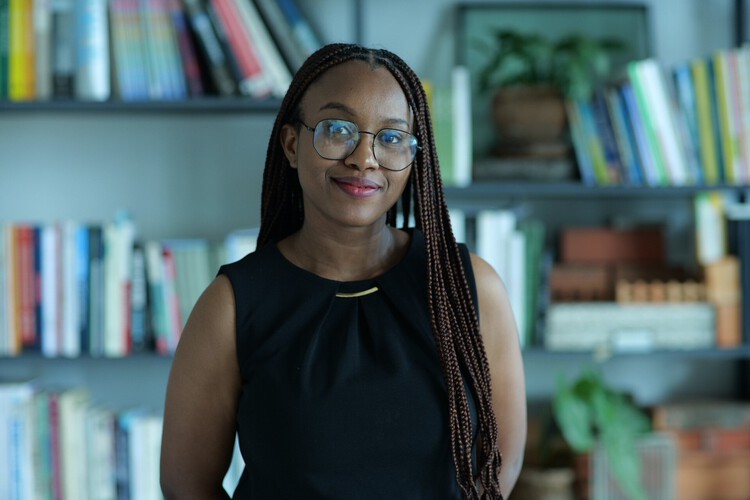
Nigerian-born architect Blossom Eromosele has developed AllSpace, a modular housing design inspired by traditional African architecture. The design was created as part of the Swarovski Foundation's fourth edition of the Creatives for Our Future global mentorship and grant program, developed in collaboration with the United Nations Office for Partnerships. Among the six selected projects, AllSpace seeks to respond to the current Nigerian refugee crisis with a low-cost, solar-powered housing solution for camps.
The Creatives for Our Future program invites applicants working on projects or products that use creativity to accelerate awareness, technology, or solutions that drive progress toward the Sustainable Development Goals (SDGs). According to the UN Development Programme, over 3.2 million people in Nigeria have been internally displaced due to ongoing conflicts in the northeast, extreme weather events caused by climate change, and rapid urbanization. According to Eromosele, many refugee camps lack essentials such as sanitation, reliable energy, and robust construction, and often do not offer privacy.

In response to the need to improve living conditions for displaced communities, AllSpace modular housing aims to foster a sense of familiarity and belonging. Inspired by traditional African huts, the structures are made from recycled materials and powered by solar energy, offering a scalable alternative for temporary settlements. The AllSpace units include a solar-powered lighting system made from reused e-waste and plastic bottles, developed by Stanley Anigbogu, also a member of the 2024 Creatives for Our Future cohort. Blossom's work in sustainable architecture has earned her the Young Global Changer Award and her selection as a Young Climate Prize Fellow.
Related Article
How Modular Construction Can Provide Architectural Aid: From Rapid-Response to Transitional and Affordable HousingWith support from the Creatives for Our Future program, future steps are to test and refine prototypes in a refugee camp, developing materials suited to different environments and terrains. With continued backing from the Swarovski Foundation, the goal is to expand AllSpace to more communities, in the ongoing quest to ensure that displaced families have access to safe housing while also addressing environmental challenges. By collaborating with different communities, the design can be adapted to meet specific needs, cultural norms, and environmental conditions.

The Creatives for Our Future program is open to creatives worldwide aged 21–30 from disciplines including fashion, design, architecture, science, technology, and engineering, with no limit on creative medium. Now in its fourth year, six winners were chosen from 487 applicants. In addition to Blossom Eromosele's housing solution, the selected projects include textiles made from ocean waste collected by local fishermen, a device that makes music more accessible to the Deaf community, non-toxic dyes and pigments, an external graphics card enclosure that extends the lifespan of laptops, and a bio-cladding system using lightweight tiles embedded with water reservoirs to cultivate algae and moss.
In other recent African architecture news, Lagos-based Oshinowo Studio revealed a new design for a Commonwealth War Graves Commission memorial honoring Sierra Leone's WWI Carrier Corps. Regarding refugee housing and settlements, by the end of 2024, Counterspace Studio, led by Sumayya Vally, designed a wellness facility in the world's largest refugee settlement in Kakuma, Kenya, while MVRDV transformed shipping containers into sports and community hubs for refugees.





